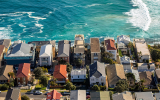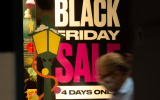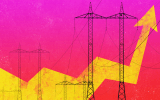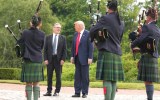
US President Donald Trump says nations – including Australia – that fail to negotiate deals with America could find their tariffs doubled.
Trump said on Monday he was planning a new tariff “for the world”.
“I would say it’ll be somewhere in the 15 to 20 per cent range,” he said, sitting alongside British Prime Minister Keir Starmer at his luxury golf resort in Turnberry, Scotland.
“I just want to be nice. Probably one of those two numbers.”
Most of the US’s trading partners, including Australia, are currently subject to America’s 10 per cent “baseline” tariff. But Trump’s most recent comments suggest Australian exports could among those slugged with the new, higher “world tariff”.
“We’re going to be setting a tariff for, essentially, the rest of the world,” Trump said.
“That’s what they’re going to pay if they want to do business in the United States, because you can’t sit down and make 200 deals.”
Trump, who has vowed to end decades of US trade deficits by imposing tariffs on nearly all trading partners, has already announced higher rates of up to 50 per cent on some countries – including Brazil – from Friday.
The announcements have spurred feverish negotiations by a host of countries seeking lower tariff rates, including India, Pakistan, Canada and Thailand.
On Sunday, Trump clinched a huge trade deal with the European Union that includes a 15 per cent tariff on most EU goods, $US600 billion ($A920 billion) of investments in the US by European businesses and $US750 billion in energy purchases over the next three years.
That followed a $US550-billion deal with Japan last week and smaller agreements with Britain, Indonesia and Vietnam.
Other talks are ongoing, including with Australia, but prospects have dimmed for many more agreements before Friday – Trump’s deadline for deals before higher rates take effect.
Trump has repeatedly said he favours straightforward tariff rates over complex negotiations.
Assistant Treasurer Daniel Mulino said Australia would have to wait and see the specifics of the announcement, adding Trump made the statement in an “off-the-cuff way”.
“What I do know is that right now we are engaging with the US,” he told Sky News on Tuesday.
“We’re seeking to get the best possible deal we can out of the US.
“We want to go as low as possible on the tariffs, we want to maximise our access to their market, of course, and that remains our priority.”
Opposition trade spokesman Kevin Hogan said Australia should “absolutely” be worried about Trump’s comments.
“If Trump is looking to put tariffs higher, I think that’s damaging not only actually to the US consumer, which means their inflation rate will go up, but it has a real danger to slow global growth,” he said in Canberra.
“Again, bad policy from Trump.”
Hogan repeated the Coalition’s calls for Prime Minister Anthony Albanese to secure a face-to-face meeting with Trump immediately.
“He has to put a very strong sovereign case to America that their policy is bad,” he added.
“It contravenes the goodwill of the Free Trade Agreement, too, that we, when in government as a Coalition, signed with the US 20 years ago.”
University of Sydney US politics expert David Smith said it was proving hard for countries to talk their way out of tariffs on their exports to the US.
“Trump really does see tariffs as something that is good in themselves,” he said.
“Even though there were a lot of hopes at the beginning of this process that countries could negotiate their way out of tariffs altogether, that’s not really happening.”
Australia, like other nations, might instead have to pivot and try to position its industries within these deals strategically.
For example, the US pharmaceutical sector has long taken issue with Australia’s drug subsidy scheme and urged Trump to act.
In early July, he threatened a 200 per cent tariff on pharmaceuticals, which could be seen as a way for the US to chip away at the Pharmaceutical Benefits Scheme in exchange for a trade deal.
Both of Australia’s major parties say the program is not up for negotiation.
-with AAP










